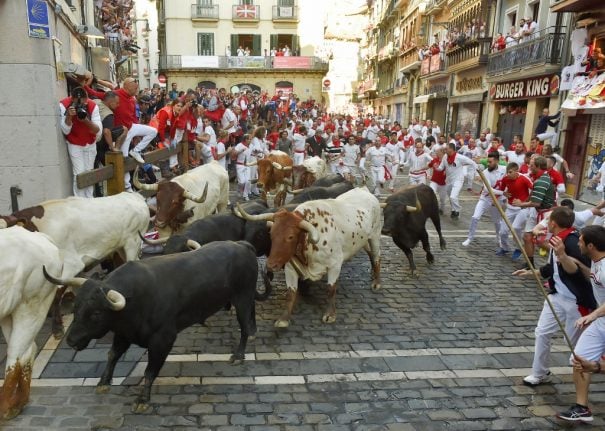San Fermin is celebrated each July in the northern city of Pamplona, Navarra, but the fiesta which draws crowds of a million revellers will not be taking place this summer.
Pamplona’s city council officially announced news of the cancellation of the event on Tuesday, confirming what many regular festival goers had suspected.
The festival, which kicks off on July 6th attracts hundreds of thousands of visitors, who cram into the Navarran capital for the eight-day long non-stop party, which involves religious parades, concerts, bullfights as well as the daily ‘encierros’ or bull runs.
Each morning at 8am crowds of runners traditionally dressed in white with red pañuelos and sashes await the release of six Spanish fighting bulls and six steers, who race through the narrow cobbled streets to the bullring.

Crowds squeezed into the sqaure infront of the town hall for the chupinazo marking the start of the fiesta: Photo: AFP
Similar encierros take place in towns across the Basque region but Pamplona's San Fermin is the biggest and most famous after being immortalised in Ernest Hemingway's 1926 novel “The Sun Also Rises”.
“As expected as it was, it still leaves us deeply sad,” said acting mayor Ana Elizalde when announcing the inevitable news that the festival could not be carried out with social distancing measures in place.
She was unable to say whether it might be held at a later date, given the unpredictability of the coronavirus health crisis.
“It seems complicated to celebrate San Fermin (at all) this year, but we will wait to see how events evolve”, she said.

Photo: AFP
It is not the only time in its history that the fiesta has been cancelled. It was also suspended in 1937 and 1938 during the Spanish Civil War, and had to be cancelled a third time in 1978 after a student was shot during clashes between police and protesters calling for an independent Basque region.
Deirdre Carney, an American now living in Spain who has has attended the fiesta since childhood, said: “The last time San Fermin was called off was the year I was born. My father was there and he and his friends were holed up in their hotel for a few days to avoid the rioting.
“That was 42 years ago, and it is completely shocking to the people of Navarra and everyone who loves the festival to have this happen again. Of course everyone understands why, and that there was no other choice, but we are nonetheless very saddened. The fiesta is a celebration of life and joy, so we will return next year and it will be even more meaningful than ever.”
READ ALSO:
- When will it be possible to travel to Spain again?
- Spain's economy set to shrink by up to 13.6 percent warns Bank of Spain
- How coronavirus is hurting Spain's farmers and fishermen



 Please whitelist us to continue reading.
Please whitelist us to continue reading.
Member comments